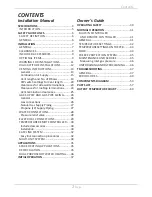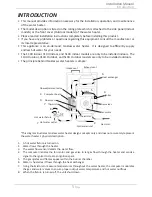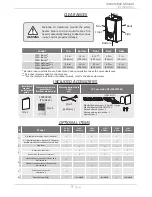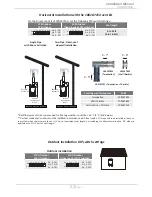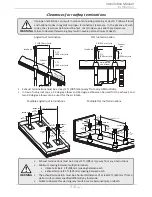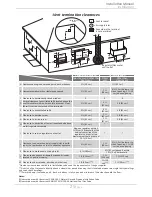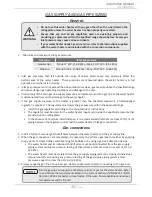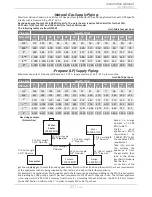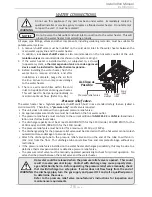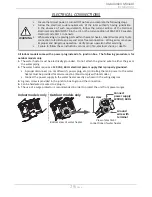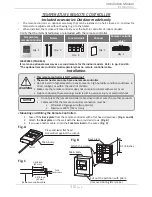
15
Page
-Combustion Air Supply-
•
This gas water heater requires an adequate source of clean air for combustion
and ventilation. Without sufficient air, your water heater may not operate
properly and may emit excessive and abnormal amounts of carbon monoxide
which may result in carbon monoxide poisoning or death.
WARNING
Before installing the water heater, you must determine the amount of air needed to supply this water
heater and any other gas appliances in the same area and provide adequate air for combustion and ventila
-
tion. Consult a qualified person if you’re unsure of the proper way to supply air to your water heater.
Before beginning
Calculate total BTU/h rating of all appliances.
To calculate the combustion air and ventilation required, add up the total BTU/h ratings of all gas burn
-
ing appliances (e.g., water heaters, furnaces, clothes dryers) in the same area. Do not include appliances
that are direct vented. Refer to the following example.
Your water heater’s BTU/h rating is on the rating plate. The BTU/h ratings should be on the other
appliances’ rating plates. If you have trouble determining the BTU/h ratings, contact the manufacturer or
have a qualified person determine the ventilation requirements.
NOTICE
:
If you are replacing your old water heater with one that has a higher BTU/h rating, the amount of
ventilation required may be greater.
Gas Burning Appliance
BTU/h Rating
Gas Water Heater
140,000
Furnace
75,000
Dryer
20,000
Total
235,000
Example:
Gas Burning Appliance
BTU/h Rating
Gas Water Heater
Total
Your
appliances:
Does your installation space have sufficient combustion air?
Ventilation with outside air is recommended for all installations. Even if the water heater is installed in a
large, open room inside the house, outdoor air is usually needed because modern homes are very tightly
sealed and often do not supply enough air to the water heater. However, when installed in a large indoor
space, it may be possible to provide enough air without outside ventilation. If you are unsure if your instal
-
lation location has enough ventilation, contact your local gas utility company or code officials for a safety
inspection or direct vent.
The following instructions will help determine if it may be possible to install the water heater without outside
ventilation.
Check for Chemicals:
Installations where corrosive chemicals may be present require the water heater to be direct vented. Air for
combustion and ventilation must be clean and free of corrosive or acid-forming chemicals such as sulfur, fluo
-
rine, and chlorine. Ventilation with outside air will reduce these chemicals, but it may not completely eliminate
them. Failure due to corrosive chemicals is not covered by the warranty. Examples of locations that require
outside air due to chemicals include:
•
Beauty salons
•
Photo processing labs
•
Indoor pools
• Laundry, hobby, or craft rooms
•
Chemical storage areas
Products such as aerosol sprays, detergents, bleaches, cleaning solvents, gasoline, air fresheners, paint and
varnish removers, and refrigerants should not be stored or used near the water heater.


